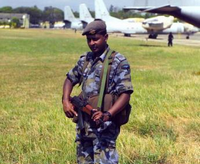In 2006, when Dutch forces occupied Uruzgan province in southern Afghanistan, they expected to wage a traditional counterinsurgency campaign focused on winning the support of the local population. "We're not here to fight the Taliban. We're here to make the Taliban irrelevant," said Dutch commander Hans van Griensven. An Australian reconstruction team subsequently joined the Dutch battlegroup, to help rebuild schools and roads, and to provide vocational training to local workers.
Dutch and Australian troops were working at a pair of schools in July 2007 when the Taliban attacked. A suicide bomber blew himself up outside one school in the provincial capital of Tarin Kowt, killing a Dutch soldier and as many as 10 Afghan children. Meanwhile, a Taliban infantry team assaulted Afghan tribal police garrisoned in nearby Chora. The resulting battle -- pitting Dutch helicopters, artillery and fighter jets versus hundreds of Taliban fighters -- represented exactly the kind of heavy combat that van Griensven had tried to avoid.
The so-called Battle of Chora was a preview of a new kind of "hybrid" warfare that is driving major changes in the military planning of the U.S. and its allies. (See Thomas P.M. Barnett's WPR column.) Another example, often overlooked, is Sri Lanka's bloody, 26-year insurgency, which ended in May when a major government offensive destroyed the Tamil Tigers rebel group. (See Brian Calvert's WPR feature article.) After significant military setbacks in earlier phases of the conflict, this spring the Sri Lankan military finally perfected a combination of tactics and organizational structures capable of defeating a heavily armed insurgent enemy, whose own forces at times resembled those of a well-established state.

